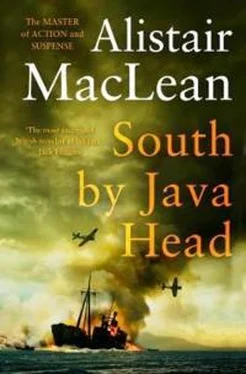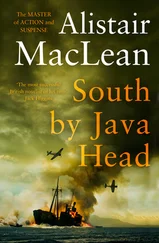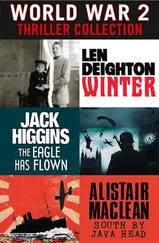“The Japs knew he had it, and they’ve put a fantastic price on his head – dead or alive – and offered a similar reward for the return or destruction of the lists. He told me all this himself. Somehow or other Siran knew of all this, and that’s what he’s been after. He’s earned his money, but I swear before God he’ll never live to collect.”
“And that’s why Bekker or whatever his name is was disguised?”
“It was my idea,” Farnholme said heavily. “I thought I was being very, very clever. Muslim priests are as good as any other priests in the world: a renegade, whisky-drinking priest is an object of contempt and everybody shuns him. I tried as best I could to be the kind of dissolute drinking companion a man like that would have. We weren’t clever enough. I don’t think we could have been anyway. The alarm call was out for Bekker the length and breadth of the Indies.”
“He was a very lucky man to have got even this far,” Nicolson acknowledged. “That’s why the Japs have been at such pains to get us?”
“Heavens above, man, surely it’s all obvious enough now!” Farnholme shook his head impatiently, then looked again at Siran: there was no anger in his eyes now, only cold, implacable purpose. “I’d sooner have a king cobra loose in this boat than that murderous swine there. I don’t want you to have any blood on your hands, Nicolson. Give me your gun.”
“How very convenient,” Siran murmured. Whatever he lacked, Nicolson thought, it wasn’t courage. “Congratulations, Farnholme. I salute you.”
Nicolson looked at him curiously, then at Farnholme. “What’s he talking about?”
“How the devil should I know,” Farnholme answered impatiently. “We’re wasting time, Nicolson. Give me that gun!”
“No.”
“For God’s sake, why not? Don’t be a fool, man. There’s not one of our lives worth a snuff of a candle as long as this man’s at large in the boat.”
“Very likely,” Nicolson agreed. “But suspicion, no matter how strong, is not proof. Even Siran is entitled to a trial.”
“In the name of heaven!” Farnholme was completely exasperated. “Don’t you know that there’s a time and place for these quaint old Anglo-Saxon notions about fair play and justice. This is neither the time nor the place. This is a matter of survival.”
Nicolson nodded. “I know it is. Siran wouldn’t recognise a cricket bat if he saw one. Get back in your seat, Brigadier, please. I’m not completely indifferent to the safety of the others in the boat. Cut one of the heaving lines in three, bo’sun, and make a job on these characters. It doesn’t matter if the knots are a bit tight.”
“Indeed?” Siran raised his eyebrows. “And what if we refuse to subject ourselves to this treatment?”
“Suit yourselves,” Nicolson said indifferently. “The brigadier can have the gun.”
McKinnon made a very thorough job of immobilising Siran and his two men, and took a great deal of grim satisfaction in hauling the ropes tight. By the time he was finished the three men were trussed hand and foot and quite unable to move: as a further precaution he had secured the three rope ends to the ring-bolt in the for’ard apron. Farnholme had made no further protest. It was noticeable, however, that when he resumed his seat on the benches beside Miss Plenderleith, he changed his position so that he was between her and the stern, and from there he could watch both her and the bows of the boat at the same time: his carbine was lying on the seat beside him.
His work done, McKinnon came aft to the sternsheets and sat down beside Nicolson. He brought out dipper and graduated cup, ready to serve out the morning ration of water, then turned suddenly to Nicolson. Half-a-dozen people in the boat were talking – the babble wouldn’t last long after the sun cleared the horizon – and his low pitched words could not have been heard two feet away.
“It’s a desperate long way to Darwin, sir,” he said obliquely.
Nicolson lifted his shoulders in a half-shrug and smiled: but his face was dark with worry. “You, too, Bo’sun? Maybe my judgment was wrong. I’m sure that Siran will never stand trial. But I can’t kill him, not yet.”
“He’s just waiting his chance, sir.” McKinnon was as worried as Nicolson. “A killer. You heard the Brigadier’s story.”
“That’s the trouble. I did hear his story.” Nicolson nodded heavily, looked at Farnholme, glanced at McKinnon and then stared down at his hands. “I didn’t believe a damn’ single word he said. He was lying all the way.”
The sun wheeled like a great burning ball above the eastern horizon. Inside an hour nearly all talk was stopped and people were crawling back into their shells of remote indifference, each alone with his own private hell of thirst and pain.
Hour succeeded interminable hour, the sun climbed higher and higher into the empty washed-out blue of the windless sky, and the lifeboat remained as she had been for days on end now, motionless on the water. That they had moved many miles south in those days Nicolson was well aware, for the current set due south from Straat Banka to the Sunda Strait eleven months out of twelve: but there was no movement relative to the water surrounding them, nothing that the human eye could see.
Nobody moved aboard the boat any more than the boat moved on the surface of the sea. With the sun swinging high towards the zenith, the slightest effort brought exhaustion in its wake, a panting of breath that whistled shrilly through a bone-dry mouth and cracked and blistered lips. Now and again the little boy moved about and talked to himself in his own private language, but as the day lengthened and the hot and humid air became more and more oppressive and suffocating, his activities and his talk lessened and lessened until finally he was content to lie still on Gudrun’s lap, gazing up thoughtfully into the clear blue eyes: but by and by his eyelids grew heavy and dropped, and he fell asleep.
Arms outstretched in dumb show Nicolson offered to take him and give her a rest, but she just smiled and shook her head. It suddenly came home to Nicolson, with a sense of something like wonder, that she nearly always smiled when she spoke: not always, but he’d yet to hear his first complaint from her or see the first expression of discontent. He saw the girl looking at him, strangely, and he forced a smile on his face, then looked away.
Now and again a murmur of voices came from the side benches on the starboard side. What the brigadier and Miss Plenderleith found to talk about Nicolson couldn’t even begin to guess, but find it they did, and plenty of it. In the gaps in their conversation they just sat and looked into one another’s eyes, and the brigadier held her thin wasted hand in his all the time. Two or three days ago it had struck Nicolson as mildly humorous, and he had had visions of the brigadier in a bygone and gentler age, immaculately dressed in white tie and tails and carnation in his buttonhole, hair and moustache as jet black as they were now snowy white, his hansom cab ready while he himself stood at the stage door entrance, waiting. But he couldn’t see anything funny in it, not any longer. It was all rather quiet and pathetic, a Darby and Joan waiting patiently for the end, but not at all afraid.
Slowly Nicolson’s gaze travelled round the boat. There wasn’t much change from yesterday that he could see, except that everybody seemed just that much weaker, that much more exhausted than they had been, with hardly the strength left to move into the few solitary scraps of shade that remained. They were very low. It didn’t need any expert medical eye to see that the distance from listlessness to lifelessness was only a very short step indeed. Some were now so far through that it was only by a conscious effort that they could rouse themselves to accept their midday ration of water, and even then one or two found the greatest difficulty in swallowing. Forty-eight hours and most of them would be dead. Nicolson knew where they were, near enough, since he still had his sextant with him: in the vicinity of the Noordwachter light, perhaps fifty miles due east of the coast of Sumatra. If neither wind nor rain came within the next twenty-four hours, then it wouldn’t matter after that whether it came or not.
Читать дальше
Конец ознакомительного отрывка
Купить книгу










